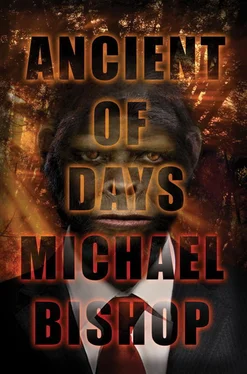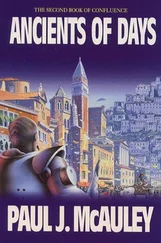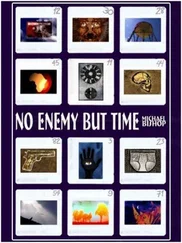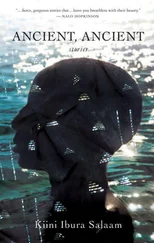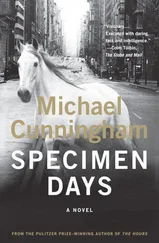Georgia Highway Patrolmen directed traffic. Uninvited out-of-towners they sent back to the interstate. Relatives, friends, and invited locals, they checked through the front gates of Paradise Farm. They also saw to it that those who could not park their vehicles inside the walls pulled them safely off the two-lane connecting Tocqueville and Beulah Fork.
Through the window of the upstairs bedroom we’d shared, Caroline estimated that nearly every inhabitant of Beulah Fork had showed up—nothing like a funeral to draw people together and nothing like a double funeral for a killer and his final victim to swell the crowd a hundredfold. My parched front lawn swarmed with would-be mourners. Most women wore Sunday dresses or tailored Sunday suits. Most men, ties knotted beneath their Adam’s apples like tourniquets, sported linen or seersucker jackets. A gay solemnity informed their movements. Some children with scrubbed faces clung to the adults’ hands. Other children, more eager, darted through the maundering crowd to find good places in the pecan grove from which to watch the ceremony.
“Thank God we don’t have to feed this bunch,” Caroline said.
Standing at a mirror trying to put a Windsor knot in a new tie, I grunted.
Fifteen security guards roamed the grounds, while a sixteenth had his vantage on the widow’s-walk just above the room that Caroline and I were in. The Montarazes and I were sharing the cost of the guards, RuthClaire and Adam because the FBI had told them that most of their ransom money would be recovered, I because I hoped to keep a few of the rowdier mourners out of my flowerbeds and shrubbery.
Caroline kept tabs on the number of mourners here for Craig Puddicombe and for Tiny Paul. So far, she said, the latter group seemed to have the upper hand. If any active Klan members had come, they’d had either the tact or the caution to leave their sheets on their beds and their dunce caps on high closet shelves. Besides, a few of those coming to pay their respects to young Puddicombe surely had no Klan affiliation at all.
“Have you seen Craig’s mother?”
“Bilker met her at the gate and took her around back fifteen or twenty minutes ago. She’s fine.”
“Does she know Bilker shot her son?”
“I don’t think so. I hope not.”
Beyond the gate, Caroline saw vans belonging to the Atlanta, Columbus, and Tocqueville newspapers, and three or four TV news vans too. I had asked the highway patrol to keep them from entering. I had also ordered my security people to apprehend any intruders and return them to the gate. Paradise Farm was private property, today’s ceremony was to benefit family and guests, and reporters in their capacity as reporters were not welcome. If they chose to ignore these fiats, the Montarazes would sue them for invasion of privacy while I pressed charges for unlawful trespass.
At last, I signaled to Caroline I was ready to go. To my shame, she had finished dressing at least ten minutes before me. Her knee-length white dress had bunched sleeves and a rectangle of blue-and-white English smocking across the bodice. She put her arm through mine, and we left the room together.
“I could not have done this if RuthClaire had come,” she said.
She was talking about spending the night with me in my former wife’s old house. It had seemed strange to me, too. Had RuthClaire accompanied Adam to Paradise Farm, I would have been no more able to share a bed with Caroline than Caroline with me. But my ex had not come to Beulah Fork. The very thought of a double funeral for her son and his murderer had appalled her. Therefore, she and Adam had had a private ceremony on Hurt Street. Afterward, she had flown to Charlotte to visit an octogenarian maiden aunt and to recuperate from an ordeal that would always haunt her. She was there now, boycotting Adam’s ostentatious show of generosity and forgiveness.
In the back yard, Adam stood on the deck facing a crowd that pressed against the cedar platform and spread out into the pecan grove. In a grassy area cordoned off with red velvet ropes and brass posts, Caroline and I joined the Puddicombes. We stood right in front of the deck, and none of the Puddicombes looked at or spoke to us as we entered. I nodded at familiar faces outside the paddock, but to most of the mourners our arrival was a sign to shut up and stop jostling. Only the midges and a few frolicsome mockingbirds in the pecan trees refused to settle down.
“Welcome to these sacred rites,” Adam said. Of all those present, only Caroline, Bilker, and I had ever heard him speak before, and the guttural aspect of his voice—its powerful growliness —seemed to startle some of those around us. Small as he was, Adam commanded attention. He had worn a silk top hat, a frock coat with tails, striped ambassadorial trousers, a white vest, a dove-gray tie, and spats. To his right was a pedestal draped with a piece of velvet reminiscent of the voodoo banners that David Blau had once shown in Abraxas. Atop the covered pedestal sat the burial urn containing Tiny Paul’s ashes. To Adam’s left, the bier upon which Craig Puddicombe’s casket rested. The casket also boasted a colorful, sequined banner. In the August sun, the sequins glittered like melting ice.
“Ashes to ashes, dust to dust,” the habiline said. He gave everyone a painful grimace, almost a fear-grin. “For most of my last year in your strange country, it has worried me, the problem of what I am to you and how I must be standing spiritually in the scales of God. Longer, I will not worry. We all come from and go back to dust.”
“Amen!” said Livia George behind us. She, Hazel Upchurch, and a small contingent of local blacks occupied an area between the trees and the sundeck.
“My dead son had a soul, as did the young man who murdered him. And I, Adam Montaraz, citizen and exile, habiline and human, have a soul—as does the heartbroken mother of Craig Puddicombe. All God’s children, I say unto you, have souls.”
“Praise the Lord,” said a man next to Hazel Upchurch.
“All who suffer and know that they suffer, all who yearn for solace and know that they yearn, all who have heavenly expectations and know that they have them—all such, I emphatically say, have souls, for it is our souls that suffer, yearn, expect, and know , our souls that feel the pain, sorrow, and joys of each of these deeply feeling processes.”
“Amen,” murmured many people approvingly.
“My God,” I whispered, “he’s preaching a full-bore sermon.”
Caroline shushed me.
“The soul is what the body does, I say. It is also the perceptive self-knowledge of its doing what it does. Paulie, my dead son, was beginning to grow into such soulful awareness. His soul, I must tell you, was beginning to bloom. No one here today, I fear, can guess at the shape toward which it was tending, but in my heart—yes, my father’s proudness speaks now—I am almost sure it would have been beautiful, very beautiful.”
“Praise God.”
“The soul of Craig Puddicombe had already opened.” He gestured at the vevés -draped casket. “It had an unhappy shape because he was unhappy. He hated and knew that he hated. He killed and knew that he killed. He hurt and knew that he hurt. He knew that even by giving pieces of this hurt to others, he would never—not ever—uproot the hurt sickening him unto very death. His soul would never in this life acquire a happy spiritual handsomeness.”
“Growing up, he was always a good boy!” shouted Craig Puddicombe’s mother. “His soul was as handsome as anybody’s!”
This outburst embarrassed Mrs. Puddicombe. She folded her arms beneath her breasts and hunched her shoulders. Caroline reached as if to pat her on the arm, but the woman leaned into her father-in-law, a sickly man with glazed eyes, to avoid an outsider’s touch.
Читать дальше
